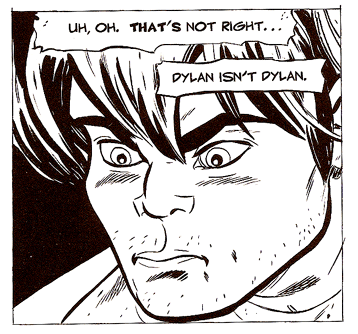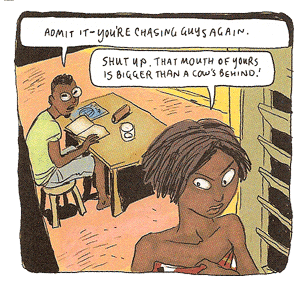

| July 2008 |
|
| Jeff Smith : Rasl | |
 What do you do after Bone? The safest bet would be more of the same: accessible yet affecting comics, an unlikely but successful mixture of Tolkien and Walt Kelly. Or maybe variations on the theme, like the delightful Stupid, Stupid Rat-Tails, the story of Big Johnson Bone, explorer extraordinaire.
What do you do after Bone? The safest bet would be more of the same: accessible yet affecting comics, an unlikely but successful mixture of Tolkien and Walt Kelly. Or maybe variations on the theme, like the delightful Stupid, Stupid Rat-Tails, the story of Big Johnson Bone, explorer extraordinaire.
But no, Smith has pulled a Gaiman and struck out for new territory... judging from the first two issues, noir urban fantasy, reminiscent of Tim Powers. It's almost odd to see a Jeff Smith without jokes or medieval stonework, with swearing and naked women.
Rasl is a young man who's discovered how to travel to parallel universes. He uses this ability to make his living as a thief: he steals the parallel versions of famous artworks and sells them to collectors. Only someone is after him-- a big mutant in a black coat who starts shooting at him and, even more annoyingly, hits the painting. He holes up for a bit with a cute prostitute, but things only get worse...
It looks like we're in for a long interesting ride. We've learned very little about Rasl so far, but I'm captivated. As with Bone, the storytelling is supremely confident from the start. No panel is wasted, and there's only enough exposition to make us want to know more.
Nothing seems to be validated in American culture till it's made into a movie; but movies generally can't do the leisurely, exploratory storytelling that comics excel at. If Rasl were a movie, it wouldn't be allowed to take time to set up its story. (It's the tempo of production that's a killer... the comic comes out quarterly, which at least is better than Love and Rockets.)
| Marguerite Abouet & Clément Oubrerie : Aya | |
 For some reason Africans rarely get a voice in Western culture. Movies about Africa always seem to have a white protagonist, or at least an American one. And undoubtedly more people have read Joseph Conrad or Alan Paton or Isak Dinesen than Wole Soyinka or Chinua Achebe or Pepetela. And I haven't seen a single African comic-- till now.
For some reason Africans rarely get a voice in Western culture. Movies about Africa always seem to have a white protagonist, or at least an American one. And undoubtedly more people have read Joseph Conrad or Alan Paton or Isak Dinesen than Wole Soyinka or Chinua Achebe or Pepetela. And I haven't seen a single African comic-- till now.
Aya is a charming comedy of manners, set in Abidjan, capital of the Ivory Coast, and written by an Ivorian. Aya herself is a very studious teenage girl, who wants to be a doctor despite being from a poor family-- she has "role model" written all over her. Fortunately, her friends Bintou and Adjoua are there to supply the irresponsible fun. They are both boy-crazy, and anxious to rise in the world by picking the right man.
Along the way there's some satire of the men as well-- e.g. Aya's father, busy buttering up the big boss in order to get ahead, or Moussa, the nerdy, funny-looking boy whose one advantage is being rich. These kids have a lot of freedom; on the other hand families seem to be much stronger. (An old man warns a young man who's just accosted Aya, "You were about to hit a girl and you don't even know who her father is.")
As a bonus, Abouet includes an appendix that tells you how to wear a pagne and what messages the patterns have, how to manage a sexy walk, and how to make ginger juice and peanut sauce.
The book is set in 1978. Sadly, the bustling, prosperous Ivory Coast of that time is no more; it's been blasted by economic stagnation, coups and civil war.
